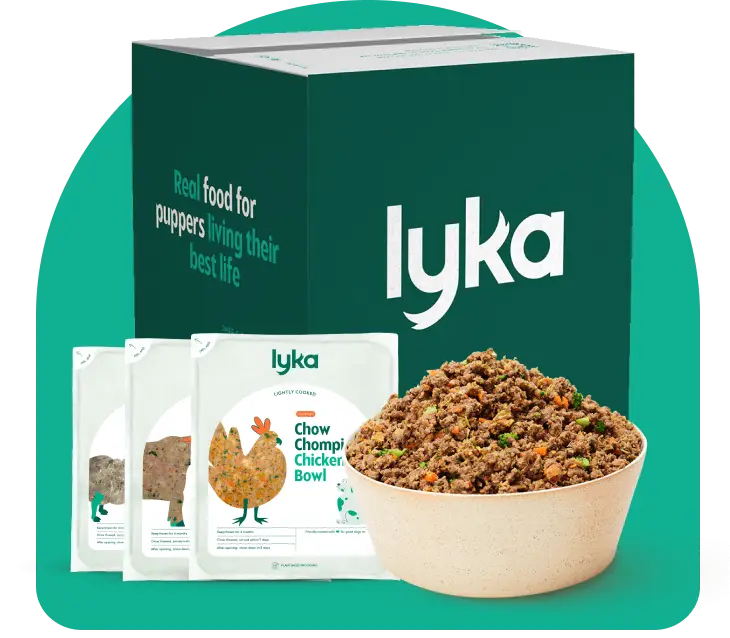3 ways to embrace the healing power of food in your dog's diet

By Matthew Muir

Using food to promote good health and treat medical conditions in humans has been a widespread practice for centuries. It goes all the way back to Hippocrates, who coined the phrase: “Let food be thy medicine and medicine be thy food”. Nowadays, we still reach for a cup of ginger and lemon tea when we’re sick, and we are excited follow the scientific research on eating superfoods, adaptogens and the like, to promote a healthy body.
It turns out, we can and should be doing the same for our dogs. There are many ways we can embrace the healing power of natural wholefoods to keep our dogs healthy and vibrant. Using food as medicine for our dogs is also a compelling way to manage or treat certain illnesses instead of relying on pharmaceutical medications.
So how can we use natural remedies to prevent our dogs from disease and keep them as healthy as possible, for as long as possible? We teamed up with Dr Matthew Muir, from All Natural Vet Care, a holistic veterinary hospital in Sydney, to look into the three key ways we can be using food as medicine, for our dogs.
Eat in harmony with dog’s ancestral diet
At All Natural Vet Care, we recommend natural, real-food diets low in starch and carbohydrates. We tend to recommend minimally processed foods, raw, freeze dried or gently cooked as they retain the most bio-available nutrients including vitamins and minerals as well as enzymes.
Some specific checks you can do on your dog’s ingredient list:
Protein-first. Fresh, animal meats, including offal, should make up the majority of your dog’s food. An extra plus if these are grass-fed or free-range meats, as typically, grain-fed livestock contain different levels of micronutrients, to your dog’s ancestral prey. Also, watch out to steer clear of any meat “meal”. This is a tell-tale sign the meat is highly processed and therefore lack natural nutrients.
Essential Fatty Acids. If you are able to source grass-fed meats, they will have higher levels of omega 3 fatty acids, however, if this is not completely achievable, it is recommended to look to marine or plant sources of omega fatty acids, such as oily fish lower in the feedchain such as mackerel and sardines, oysters and mussels, as well as plant based sources such as hemp, coconut and flaxseed oil. Ultraclean sources of fish oil can be used but be aware that they can become rancid with extended shelf life.
Low carbohydrates and starch. Steer clear of high starch foods such as rice, potatoes, corn and soy, particularly in large portions. Instead, opt for green veg such as spinach, kale and celery. All vegetables should be finally chopped, as this mimics the stomach contents of ancestor’s prey and increases digestibility of the food (dogs aren’t great at digesting large chunks of vegetables).
Variety of natural micronutrients. Dog’s ancestors were foragers and scavengers, so look for ingredients that resemble those on the forest floor, such as a variety of seeds and herbs.

Use foods that target pathways for chronic disease in dogs, namely insulin resistance and inflammation
Feeding your dog bio-available foods is like providing them with the right fuel to run their internal engine smoothly. Minimally processed nutrient-dense foods can allow your dog the chance to heal at the cellular level while building strong defences to enable them to combat illnesses and toxins.
At All Natural Vet Care, after years of clinical experience in concert with a review of the latest scientific literature, we are confident that a higher animal protein, high healthy fat (omega 3), moderate fibre, low carbohydrate diet that agrees with your pet, seems to reduce incidences of chronic disease, enhance immune function and overall vitality.
In particular, insulin resistance and chronic inflammation in dogs is thought to be a predecessor in many of the diseases faced by dogs today. Feeding a whole food, anti-oxidant-dense diet low in carbohydrates with a high omega 3 to omega 6 ratio is key, as this promotes reduced inflammation and cellular damage in your dog’s body.
Understand that each dog is biochemically unique
Each dog is biochemically unique, and improving science and nutritional knowledge, it’s becoming feasible to better understand which foods and nutrients vibe (or don’t) with your dog.
Nutrigenomics explores the interface between the genome and the diet. It is based on the notion that food provides information to our genes and triggers messages that foster health or disease. It is an emerging science that we are very excited about.
At All Natural Vet Care, we pride ourselves the advanced nutritional and gut health techniques we are offering and researching in our clinic. We work closely with global leading immunologist Jean Dodds, author of “Canine Nutrigenomics” and building a microbiome donor bank of animals that have been comprehensively screened for physical and psychological problems.
We are utilising the Nutriscan Saliva Test to identify food intolerance and sensitivities and are excited to announce that in addition to the many patient success stories we have experienced here in Australia, this has recently been scientifically validated in Germany and the USA.
For more information on Food Nutrition, and Food Counselling services, see the All Natural Vet website here.






